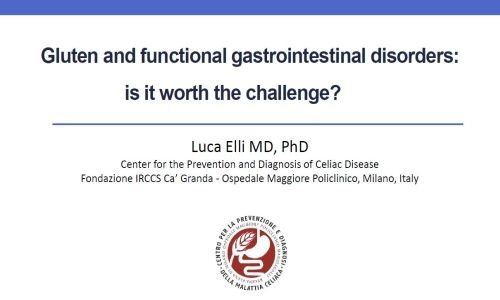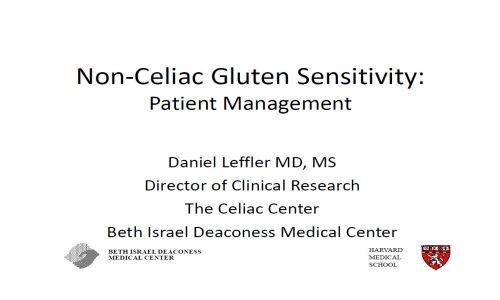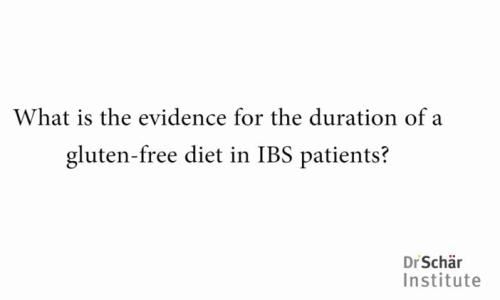Treatment of non-celiac gluten sensitivity
As with celiac disease, the therapy for non-celiac gluten sensitivity (NCGS) is to avoid gluten. However, it is not generally necessary to maintain a gluten-free diet as strictly or for as long as with celiac disease. It is important that the patient only begins a gluten-free diet after the diagnosis is confirmed.
In the context of diagnosis a gluten-free diet represents an important criterion for confirming NCGS. If neither celiac disease nor wheat allergy are present, a trial gluten-free diet may be introduced. If the symptoms improve within a two week period, and then occur again after a gluten challenge, NCGS is likely to be confirmed. The patient should only switch to a gluten-free diet once the diagnosis is confirmed.
Low-gluten rather than gluten-free
It has been demonstrated that patients with NCGS may be able to tolerate a small amount of gluten without developing symptoms [1]. After one or two years of a gluten-free diet, patients with NCGS can attempt to reintroduce small amounts of gluten. In contrast to celiac disease, a strict gluten-free diet is therefore not mandatory in cases of NCGS; a low-gluten diet may be sufficient to avoid symptoms. How much gluten can be eaten without any problems must be tested individually. The fact that it is not necessary to maintain a permanent gluten-free diet is a crucial difference to celiac disease, which requires strict lifelong maintenance of a gluten-free diet.Amylase-trypsin inhibitors as a possible trigger
There is currently a lack of research to confirm whether gluten is the trigger of symptoms amongst patients with NCGS, or whether other fractions within gluten-containing cereal grains e.g. amylase-trypsin inhibitors (ATIs) – primarily found in wheat, are to blame [2]. Because gluten-free foods are naturally wheat-free and thus contain no ATIs, a gluten-free or low-gluten diet is generally the recommended therapy option for patients with NCGS.FODMAPs as a possible trigger
There are suspected NCGS patients who do not respond to a gluten-free diet. Studies have indicated that a low-FODMAP diet improves symptoms in some patients with irritable bowel syndrome (IBS) [3], therefore an alternative diagnosis of IBS, treated by a low-FODMAP diet may yield results for such patients.References
- Catassi C, Elli L et al. Diagnosis of Non-Celiac Gluten Sensitivity (NCGS): The Salerno Experts' Criteria. Nutrients. 2015 Jun 18;7(6):4966-77.
- Junker, Y. et al. Wheat amylase trypsin inhibitors drive intestinal inflammation via activation of toll-like receptor 4. J. Exp. Med. 209, 2395–2408 (2012).
- Biesiekierski, J. R. et al. No effects of gluten in patients with self-reported non-celiac gluten sensitivity after dietary reduction of fermentable, poorly absorbed, short-chain carbohydrates. Gastroenterology 145, 320–328 (2013).
Further information on this topic
Download
1
Show all
Professional articles
2
Show all
Presentations
2
Show all
Studies
1
Show all
Videos by Experts
3
Show all

Gluten Sensitivity Booklet
Based on the information from the consensus conference and further research Dr. Schär's Professional Team has developed a new booklet on gluten sensitivity. This booklet provides the most up to date information on the symptoms, diagnosis, and treatment of gluten sensitivity. The content summarizes the information from the expert consensus conference and further research from the leading researchers in this developing area of gluten related disorders.

Gluten Sensitivity Booklet
Based on the information from the consensus conference and further res...

Gut Microbiota in Health and Disease
Ms Wilson’s article reviews the influence of the environment on the gut microbiome and discusses potential dietary avenues to improve it.
>> Read more... <<<
>> Read more... <<<

The influence of the microbiome on gluten-related diseases
The increasing prevalence of food intolerances, especially in relation to certain carbohydrates, represents a global health problem. Moreover, intolerance of gluten and gluten-bound substances, e.g. amylase-trypsin inhibitor (ATI) is blamed for intestinal (e.g. meteorism, pain, constipation, diarrhea) and extra intestinal symptoms (e.g. fatigue, headaches, joint pain, skin irritation) in affected patients. The pathogenesis of food intolerances is blamed on factors such as changes in the composition of the intestinal flora and its influence on mucous membrane immune tolerance.
>> Read more... <<<
>> Read more... <<<

Gut Microbiota in Health and Disease
Ms Wilson’s article reviews the influence of the environment on the gu...

The influence of the microbiome on gluten-related diseases
The increasing prevalence of food intolerances, especially in relation...

Gluten and functional gastrointestinal disorders: is it worth the challenge? (2015)
Luca Elli MD, PhD
Center for the Prevention and Diagnosis of Celiac Disease
Fondazione IRCCS Ca’ Granda
Ospedale Maggiore Policlinico, Milano, Italy
16th International Coeliac Disease Symposium 2015 in Prague
Pre-Conference Workshop on Gluten Sensitivity "The Evolving Planet of Gluten Related Disorders"
Center for the Prevention and Diagnosis of Celiac Disease
Fondazione IRCCS Ca’ Granda
Ospedale Maggiore Policlinico, Milano, Italy
16th International Coeliac Disease Symposium 2015 in Prague
Pre-Conference Workshop on Gluten Sensitivity "The Evolving Planet of Gluten Related Disorders"

Non-Celiac Gluten Sensitivity: Patient Management (2013)
Daniel Leffler MD, MS
Director of Clinical Research
The Celiac Center
Beth Israel Deaconess Medical Center
Harvard Medical School
Boston MA, USA
15th International Celiac Disease Symposium on September 22 – 25, 2013, Chicago
Director of Clinical Research
The Celiac Center
Beth Israel Deaconess Medical Center
Harvard Medical School
Boston MA, USA
15th International Celiac Disease Symposium on September 22 – 25, 2013, Chicago

Gluten and functional gastrointestinal disorders: is it worth the challenge? (2015)
Luca Elli MD, PhD
Center for the Prevention and Diagnosis of Celiac D...

Non-Celiac Gluten Sensitivity: Patient Management (2013)
Daniel Leffler MD, MS
Director of Clinical Research
The Celiac Cente...

Effect of gluten free diet on immune response to gliadin in patients with non-celiac gluten sensitivity
ABSTRACT
BACKGROUND:
Non-celiac gluten sensitivity is a syndrome characterized by gastrointestinal and extra-intestinal symptoms occurring in a few hours/days after gluten and/or other wheat protein ingestion and rapidly improving after exclusion of potential dietary triggers. There are no established laboratory markers for non-celiac gluten sensitivity, although a high prevalence of first generation anti-gliadin antibodies of IgG class has been reported in this condition. This study was designed to characterize the effect of the gluten-free diet on anti-gliadin antibodies of IgG class in patients with non-celiac gluten sensitivity.
METHODS:
Anti-gliadin antibodies of both IgG and IgA classes were assayed by ELISA in 44 non-celiac gluten sensitivity and 40 celiac disease patients after 6 months of gluten-free diet.
RESULTS:
The majority of non-celiac gluten sensitivity patients (93.2%) showed the disappearance of anti-gliadin antibodies of IgG class after 6 months of gluten-free diet; in contrast, 16/40 (40%) of celiac patients displayed the persistence of these antibodies after gluten withdrawal. In non-celiac gluten sensitivity patients anti-gliadin antibodies IgG persistence after gluten withdrawal was significantly correlated with the low compliance to gluten-free diet and a mild clinical response.
CONCLUSIONS:
Anti-gliadin antibodies of the IgG class disappear in patients with non-celiac gluten sensitivity reflecting a strict compliance to the gluten-free diet and a good clinical response to gluten withdrawal.
Resource: BMC Gastroenterol. 2014 Feb 13
Caio G, Volta U, Tovoli F, De Giorgio R
BACKGROUND:
Non-celiac gluten sensitivity is a syndrome characterized by gastrointestinal and extra-intestinal symptoms occurring in a few hours/days after gluten and/or other wheat protein ingestion and rapidly improving after exclusion of potential dietary triggers. There are no established laboratory markers for non-celiac gluten sensitivity, although a high prevalence of first generation anti-gliadin antibodies of IgG class has been reported in this condition. This study was designed to characterize the effect of the gluten-free diet on anti-gliadin antibodies of IgG class in patients with non-celiac gluten sensitivity.
METHODS:
Anti-gliadin antibodies of both IgG and IgA classes were assayed by ELISA in 44 non-celiac gluten sensitivity and 40 celiac disease patients after 6 months of gluten-free diet.
RESULTS:
The majority of non-celiac gluten sensitivity patients (93.2%) showed the disappearance of anti-gliadin antibodies of IgG class after 6 months of gluten-free diet; in contrast, 16/40 (40%) of celiac patients displayed the persistence of these antibodies after gluten withdrawal. In non-celiac gluten sensitivity patients anti-gliadin antibodies IgG persistence after gluten withdrawal was significantly correlated with the low compliance to gluten-free diet and a mild clinical response.
CONCLUSIONS:
Anti-gliadin antibodies of the IgG class disappear in patients with non-celiac gluten sensitivity reflecting a strict compliance to the gluten-free diet and a good clinical response to gluten withdrawal.
Resource: BMC Gastroenterol. 2014 Feb 13
Caio G, Volta U, Tovoli F, De Giorgio R

Effect of gluten free diet on immune response to gliadin in patients with non-celiac gluten sensitivity
ABSTRACT
BACKGROUND:
Non-celiac gluten sensitivity is a syndrome c...
What is the evidence for the duration of a gluten-free diet in IBS patients?
Reiner Ullrich, MD
Universitätsmedizin Berlin
Campus Benjamin Franklin,
Medizinische Klinik für Gastroenterologie
12203 Berlin, Germany
At the Expert Meeting 2014 in Salerno, Italy
Universitätsmedizin Berlin
Campus Benjamin Franklin,
Medizinische Klinik für Gastroenterologie
12203 Berlin, Germany
At the Expert Meeting 2014 in Salerno, Italy
What is the influence of a gluten-free diet on microbiota?
Professor Dr. med. Yurdagül Zopf
Internist, nutritional doctor
Univeristätsklinik Erlangen
91054 Erlangen, Germany
At the Expert Meeting 2014 in Salerno, Italy
Internist, nutritional doctor
Univeristätsklinik Erlangen
91054 Erlangen, Germany
At the Expert Meeting 2014 in Salerno, Italy
Is there increasing demand for a gluten-free diet?
Professor Dr. med. Yurdagül Zopf
Internist, nutritional doctor
Univeristätsklinik Erlangen
91054 Erlangen, Germany
At the Expert Meeting 2014 in Salerno, Italy
Internist, nutritional doctor
Univeristätsklinik Erlangen
91054 Erlangen, Germany
At the Expert Meeting 2014 in Salerno, Italy

What is the evidence for the duration of a gluten-free diet in IBS patients?
Reiner Ullrich, MD
Universitätsmedizin Berlin
Campus Benjamin Frankl...

What is the influence of a gluten-free diet on microbiota?
Professor Dr. med. Yurdagül Zopf
Internist, nutritional doctor
Unive...

Is there increasing demand for a gluten-free diet?
Professor Dr. med. Yurdagül Zopf
Internist, nutritional doctor
Unive...
www.drschaer-institute.com

